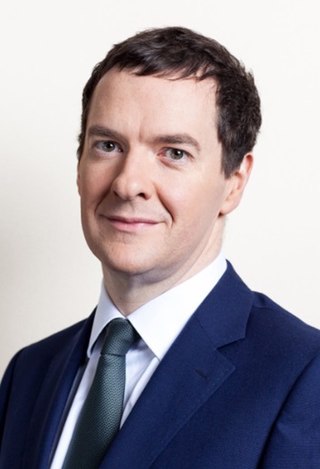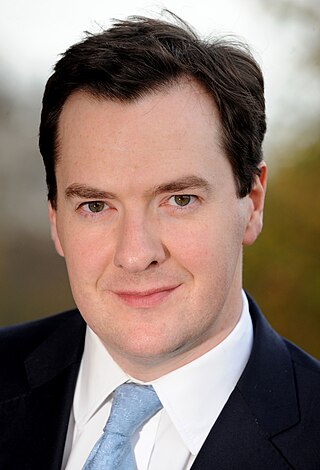The private finance initiative (PFI) was a United Kingdom government procurement policy aimed at creating "public–private partnerships" (PPPs) where private firms are contracted to complete and manage public projects. Initially launched in 1992 by Prime Minister John Major, and expanded considerably by the Blair government, PFI is part of the wider programme of privatisation and macroeconomic public policy, and presented as a means for increasing accountability and efficiency for public spending.

The Institute for Fiscal Studies (IFS) is an independent economic research institute based in London, United Kingdom, which specialises in UK taxation and public policy. It produces both academic and policy-related findings.

George Gideon Oliver Osborne is a British retired politician and newspaper editor who served as Chancellor of the Exchequer from 2010 to 2016 and as First Secretary of State from 2015 to 2016 in the Cameron government. A member of the Conservative Party, he was Member of Parliament (MP) for Tatton from 2001 to 2017.

Philip Hammond, Baron Hammond of Runnymede is a British politician and life peer who served as Chancellor of the Exchequer from 2016 to 2019 and Foreign Secretary from 2014 to 2016, having previously served as Defence Secretary from 2011 to 2014 and Transport Secretary from 2010 to 2011. A member of the Conservative Party, he was the Member of Parliament (MP) for Runnymede and Weybridge from 1997 to 2019.
A spending review, or occasionally a comprehensive spending review, is a governmental process in the United Kingdom carried out by HM Treasury to set firm expenditure limits and, through public service agreements, define the key improvements that the public can expect from these resources.

Sir Daniel Grian Alexander is a British former politician who was Chief Secretary to the Treasury between 2010 and 2015. He was the Member of Parliament (MP) for the Inverness, Nairn, Badenoch & Strathspey constituency from 2005 until the general election in May 2015. In his first parliamentary term (2005–2010), Alexander was the Liberal Democrat spokesperson for Work and Pensions (2007–2008), the Chief of Staff to party leader Nick Clegg, and Chair of the Liberal Democrat Manifesto Group (2007–2010).

Rachel Jane Reeves is a British politician who has served as Chancellor of the Exchequer since July 2024. A member of the Labour Party, she has been Member of Parliament (MP) for Leeds West and Pudsey, formerly Leeds West, since 2010. She previously held various shadow ministerial and shadow cabinet portfolios between 2010 and 2015 and from 2020 to 2024.

The Office for Budget Responsibility (OBR) is a non-departmental public body funded by the UK Treasury that provides independent economic forecasts and independent analysis of the public finances.

The June 2010 United Kingdom Budget, officially also known as Responsibility, freedom, fairness: a five-year plan to re-build the economy, was delivered by George Osborne, Chancellor of the Exchequer, to the House of Commons in his budget speech that commenced at 12.33pm on Tuesday, 22 June 2010. It was the first budget of the Conservative-Liberal Democrat coalition formed after the general election of May 2010. The government dubbed it an "emergency budget", and stated that its purpose was to reduce the national debt accumulated under the Labour government.

The United Kingdom government austerity programme was a fiscal policy that was adopted for a period in the early 21st century following the era of the Great Recession. Coalition and Conservative governments in office from 2010 to 2019 used the term, and it was applied again by many observers to describe Conservative Party policies from 2021 to 2024, during the cost of living crisis. With the exception of the short-lived Truss ministry, the governments in power over the second period did not formally re-adopt the term. The two austerity periods are separated by increased spending during the COVID-19 pandemic. The first period was one of the most extensive deficit reduction programmes seen in any advanced economy since the Second World War, with emphasis placed on shrinking the state, rather than consolidating fiscally as was more common elsewhere in Europe.

The 2016 United Kingdom budget was delivered by George Osborne, the Chancellor of the Exchequer, to the House of Commons on Wednesday, 16 March 2016.
The benefit cap is a UK welfare policy that limits the amount in state benefits that an individual household can claim per year. It was introduced by the Cameron–Clegg coalition government in 2013 as part of the coalition government's wide-reaching welfare reform agenda which included the introduction of Universal Credit and reforms of housing benefit and disability benefits. The government cited wide public support for the measure, despite it being highly controversial. The benefit cap primarily affects families with children, high rents, or both. By 2024, two-thirds of the families affected by the cap were single-parent families, half of which had a child under five.
The economic effects of Brexit were a major area of debate during and after the referendum on UK membership of the European Union. The majority of economists believe that Brexit has harmed the UK's economy and reduced its real per capita income in the long term, and the referendum itself damaged the economy. It is likely to produce a large decline in immigration from countries in the European Economic Area (EEA) to the UK, and poses challenges for British higher education and academic research.

The March 2021 United Kingdom budget, officially known as Protecting the Jobs and Livelihoods of the British People was a budget delivered by Rishi Sunak, the Chancellor of the Exchequer in March 2021. It was expected to be delivered in autumn 2020, but was postponed because of the COVID-19 pandemic. It succeeds the budget held in March 2020, and the summer statement and Winter Economy Plan held in summer and autumn 2020, respectively. The budget is the second under Boris Johnson's government, also the second to be delivered by Sunak and the second since Britain's withdrawal from the European Union. The budget was the first for government expenditure in the United Kingdom to exceed £1 trillion.

The July 2020 United Kingdom summer statement was a statement from the British Government, or mini-budget statement, delivered on 8 July 2020 by Rishi Sunak, the Chancellor of the Exchequer. It followed the budget delivered earlier in the year, and preceded the Winter Economy Plan. The purpose of the statement was to announce measures aimed at helping to promote economic recovery following the impact of the COVID-19 pandemic. The statement was delivered to the House of Commons, where Sunak unveiled a spending package worth £30bn. Concerns were subsequently raised by organisations including HM Revenue and Customs and the Institute for Fiscal Studies about the statement's impact, as well as its cost-effectiveness, while at least one major retailer declined to take advantage of a financial bonus scheme intended for rehiring employees placed on furlough during the pandemic.

The October 2021 United Kingdom budget, officially known as the Autumn Budget and Spending Review 2021. A Stronger Economy for the British People, was a budget statement made by Chancellor of the Exchequer Rishi Sunak on 27 October 2021. It was the third and final consecutive budget delivered by Sunak before his resignation in July 2022.

On 23 September 2022, the Chancellor of the Exchequer, Kwasi Kwarteng, delivered a Ministerial Statement entitled "The Growth Plan" to the House of Commons. Widely referred to in the media as a mini-budget, it contained a set of economic policies and tax cuts such as bringing forward the planned 1% cut in the basic rate of income tax to 19%; abolishing the highest (45%) rate of income tax in England, Wales and Northern Ireland; reversing a plan announced in March 2021 to increase corporation tax from 19% to 25% from April 2023; reversing the April 2022 increase in National Insurance; and cancelling the proposed Health and Social Care Levy. Following widespread negative response to the mini-budget, the planned abolition of the 45% tax rate was reversed 10 days later, while plans to cancel the increase in corporation tax were reversed 21 days later.

George Osborne served as Chancellor of the Exchequer from May 2010 to July 2016 in the David Cameron–Nick Clegg coalition Conservative-Liberal Democrat government and the David Cameron majority Conservative government. His tenure pursued austerity policies aimed at reducing the budget deficit and launched the Northern Powerhouse initiative. He had previously served as Shadow Chancellor in the Shadow Cabinet of David Cameron from 2005 to 2010.

The November 2022 United Kingdom autumn statement was delivered to the House of Commons on 17 November 2022 by Chancellor of the Exchequer Jeremy Hunt, after being delayed by three weeks from its original scheduled date of 31 October. The budget addressed the ongoing cost of living crisis, and saw the announcement of a five-year package of tax increases and spending cuts designed to steer the UK through recession. An economic forecast published on the same day by the Office for Budget Responsibility (OBR) stated the UK had entered a recession after experiencing two quarters of a shrinking economy, and predicted the UK's economy would shrink during 2023. A reduction in households' disposable income was also forecast.

The March 2024 United Kingdom budget was delivered to the House of Commons by Jeremy Hunt, the Chancellor of the Exchequer, on 6 March 2024. It was the second budget presented by Hunt since his appointment as Chancellor, the last to be delivered during his tenure as chancellor and the last budget to be presented by the Conservative government of Rishi Sunak before the party was defeated by Labour in the 2024 general election.











